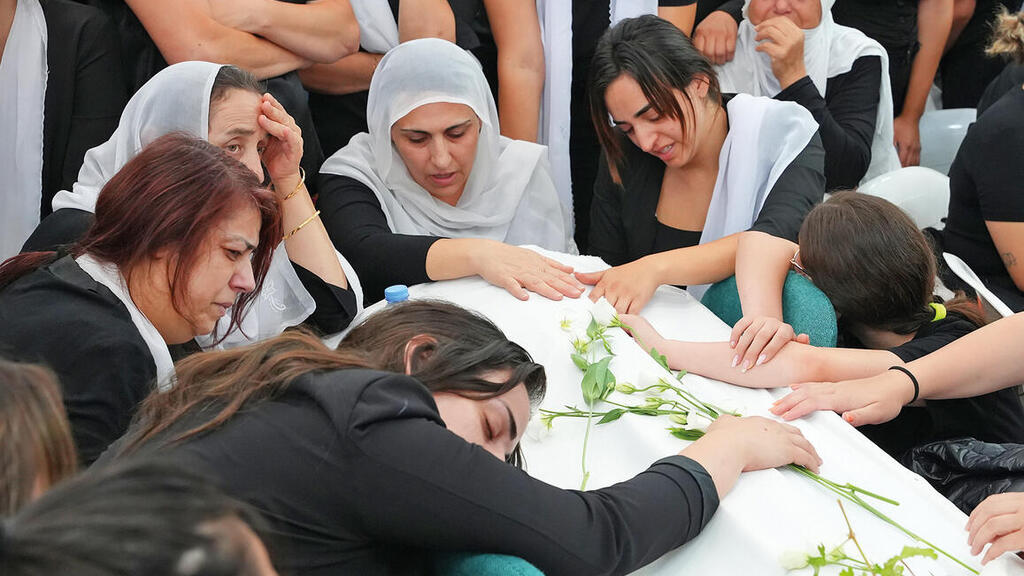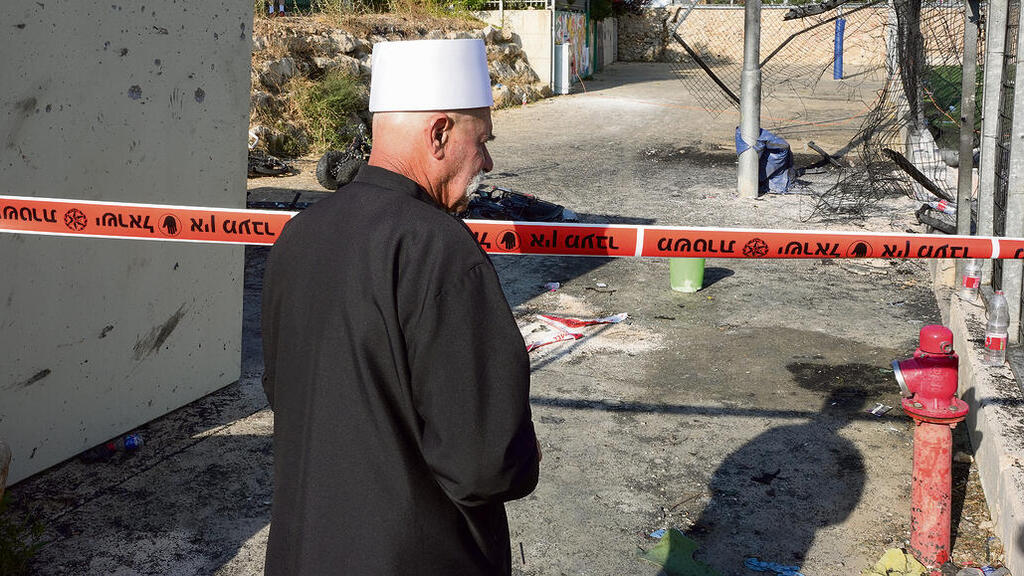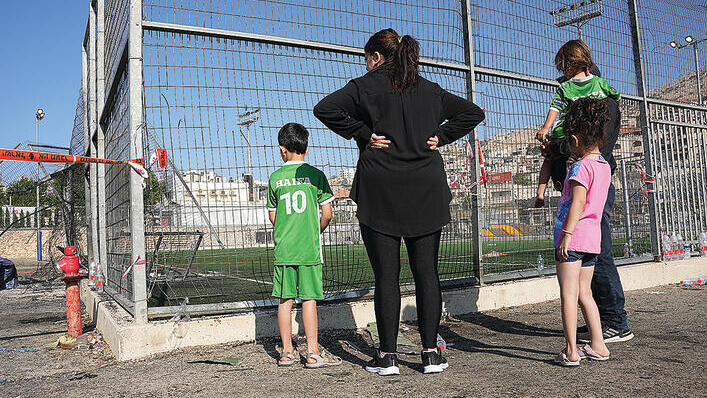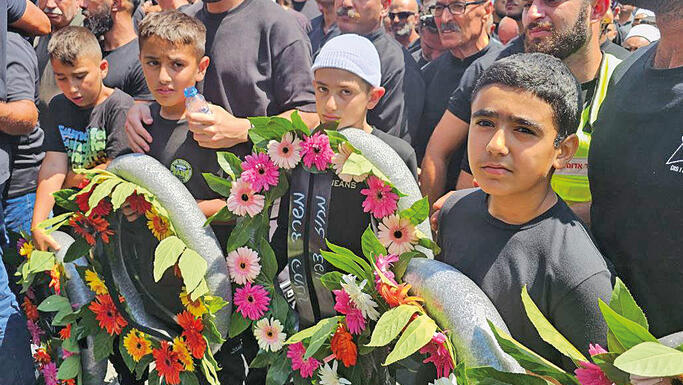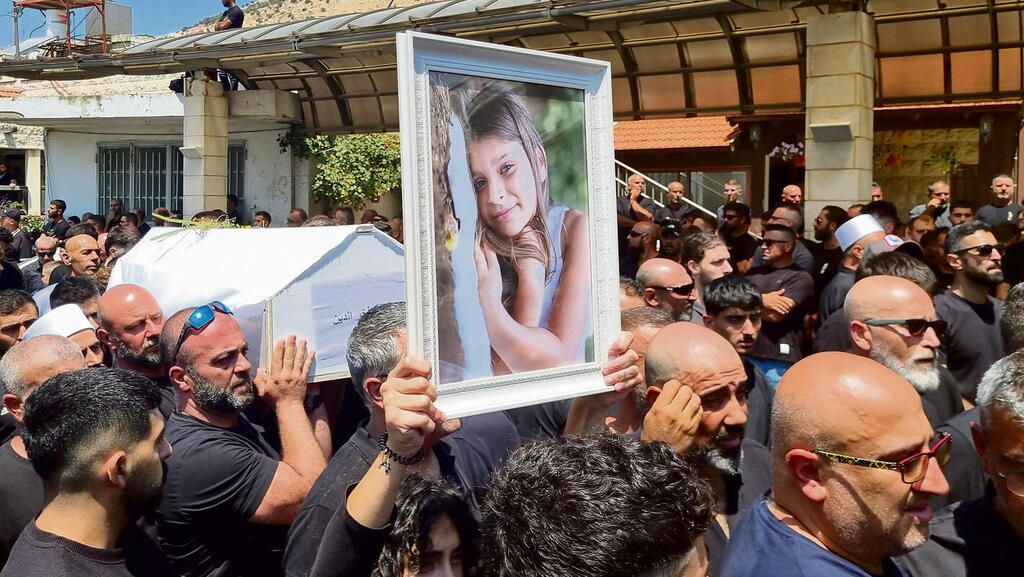Getting your Trinity Audio player ready...
At 11:00 a.m. on Sunday, the first coffin emerged from the Majdal Shams community center, where mothers, sisters, brothers and grandparents mourned their children. Ten coffins in total. A family member walked with a picture of a child in front of each of them.
The first was the face of a boy with a bow tie and a fringe haircut. Naji Taher al-Halabi, only 11 years old. And there was a blonde girl leaning against a tree. Alma Ayman Fakhr al-Din, also 11. And so, one after another, they all came out as a cloud of death hung over the village.
At the head of the procession walked a dignified man with a large beard, wearing a white religious hat, his eyes betraying no hint of his inner turmoil - Sheikh Mowafaq Tarif, the leader of Israel’s Druze community.
The square was packed. Sheikhs from Druze villages in the Golan Heights and Galilee stood alongside residents. And their eyes said it all. The shock, the tears, the pain. Even the toughest men were tearful. Some were openly weeping. It was as if they were all one big family.
"My heart broke after treating the wounded and seeing what I saw," said Samir Halabi from Daliyat al-Karmel, who has lived in Majdal Shams for eight years. There was hardly anyone in the town who didn’t know a family that had lost a child in the massacre at the soccer field.
The funeral ceremony began with a procession of sheikhs and religious figures walking up the street, followed by dozens of men singing a lamentation: "The people of the Golan are weeping bitterly for those boys and girls. A mother cries out: 'Where is my son? Don’t tell me he’s among the victims!'"
Among the speakers at the ceremony was also a sheikh from southern Lebanon, who spoke via phone. "Today you are burying our precious and righteous children. The cycle of violence brings nothing but sorrow and destruction." In the crowd were IDF soldiers from villages in the Galilee and the Carmel, one of them wearing a patch with the flags of Israel and the Druze community.
Among the 12 victims was a teenager from the Druze village of Ein Qiniyye. At the Majdal Shams local council building, we met Rabia Khatib from the village, a taxi driver. "I know all of the families who lost their children," Khatib said.
"We’re all one family. My good friend Rabia Abu-Saleh lost one of his sons, and the other was seriously injured and is now undergoing surgery. Another friend of mine, Adham Safadi, lost his daughter. May God protect them and give them strength,” he said.
Among the mourners is also a Jewish Israeli man. His name is Erez Lebanon, and he came from Kibbutz Sde Nahum in Beit She'an. "Since that Saturday (October 7), I have been looking for ways to help. I volunteered in agriculture. I was supposed to go to Jerusalem today but told myself I couldn’t go while they’re burying children here. So, I came here.”
“I’m here embracing the people, and they’re embracing me. The bomb doesn’t distinguish between Jews and non-Jews, or between 'our' Druze and the Druze of the Golan,” he added.
Hamed Almaqet recounted the moment the rocket hit the soccer field. "Our son was supposed to go to the field with a friend, but my wife didn't approve of him going. Maybe she had a gut feeling. Instead, he went to the neighbors. Then the explosion happened. I went to the clinic and helped as much as I could.”
“At some point, I found out the friend my son was supposed to go with to the field was among the victims. I didn't know what to tell him. He said, 'They're talking about my friend as missing.' I told him, 'Don't worry, they'll find him,' and turned around to hide my tears,” he added.
“In the morning, he got up and saw a picture of him. He ran to me crying, and I told him, 'There's nothing we can do. God has taken him.'"
One of the village residents arrived with his three children, two sons and a daughter. The youngest is four. The two boys are wearing Maccabi Haifa shirts. They look toward the soccer field. "They come here to play every day," the father said. "They didn't sleep at all last night. The little one started wetting the bed again."
How should the government respond?
"They need to take out Hassan Nasrallah." Samir, whose son is a Nahal Brigade combat soldier and is now in Rafah, shared the same mindset. "In my opinion, they need to wipe out southern Lebanon and southern Syria, where the terrorists are located, within 72 hours."
On the way back, at Kibbutz Amir, we met Timna Korz, an old acquaintance. She showed us a WhatsApp message she received two nights ago from a friend in Majdal Shams, named Saraya who allowed us to publish its content.
"We’re in a great disaster. Mothers are screaming, looking for their children, and the children are lying dead on the sides of the field." And another message, from Sunday: "We placed black chairs in memory of the children who were killed on the soccer field today, and every mother in Majdal told herself: 'That could have been my child.'"



